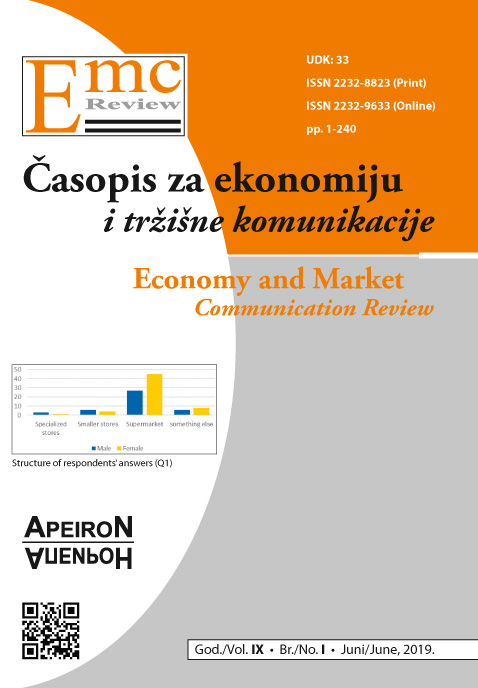STOCHASTIC MODELING OF FACTORS OF IMPROVEMENT WORKING EFFICIENCY AND SELECTION OF INTERNAL MARKETING STRATEGY
DOI:
https://doi.org/10.7251/EMC1901018LAbstract
Modern conditions of business require permanent emphasizing efficiency of work and production as the key condition of the adequate market positioning of business entities. The business result is determined by a large number of factors which define and condition it, therefore its positioning is a very complex procedure.
Positioning business system in context of the expected business result requires the launch of intellectual, technical - technological and management potential, in order to achieve optimum business result by subtle balancing of a large number of factors.
Understanding an optimal business result as a best result in context of business symbiosis of its own potential and business environment, requires subtle balancing numerous of different and heterogeneous factors.
Efficient realization business result includes a set of coordinated actions on every level of business activity, from production workers to management structures, whereby the business result ceases to be random outcome of actions, but a highly reliable business expectation.
Management competence in context of identification, quantification, qualification, inclusion, weighting of certain factors, as a form and degree of their correlation, determines the formulation, shaping and adequate involvement in decision model.
Quality of decision-making model determines degree of consent with system which is reflected, and with that implementation modeling management information becomes an effective tool in achieving business goals.
Decision-making model is not reserved exclusively for quantitative and easily visible input information, special class of decision model, but also strength of their implementation includes models which include both qualitative inputs. The level of knowledge and work skills of production worker is equal as their subjective perception which contributes to the achievement of personal satisfaction in context of work engagement as a significant factor of business success.
The launch of intellectual capital on every level of business system, requires testing the degree of correlation between the degree of expertise, business ingenuity and matching work skills and ability on one side, as well as personal satisfaction and clear metric benefits achieved on this basis from on the other side.
Initiating the potential of statistical analysis implies the adoption of a research protocol, where they include all relevant factors from aspect of research problems, so the results of the statistical analysis would have the desired management potential in terms of contribution to the business efficiency of the analyzed business system
